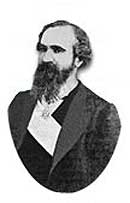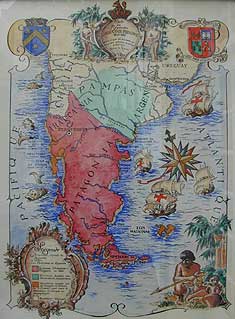An Introduction to the Kingdom of Araucanía and Patagonia
February 2004
On the 17th November 1860, the most celebrated leaders of the Mapuche nation, headed by Lonkos Kilapan and Kalfucura, of Gulumapu and Puelmapu respectively, together with the French citizen Orelie-Antoine de Tounens (a naturalized Mapuche) established a constitutional and hereditary monarchy in Wallmapu (the Mapuche territory). The outcome of months of meetings and rallies throughout the length and breadth of Mapuche territory was the creation of a great assembly known in mapuzugun as 'Futha koyan' and Orelie-Antoine was subsequently elected King of Araucanía and Patagonia by the Mapuche authorities present.
 |
The constitution - still in force today - provided for the creation of a number of ministries, a Council of the Kingdom, a Council of the State, a legislative body based on universal suffrage and a Supreme Court of Justice. The political and administrative systems were made up entirely of Mapuches. Lonko Kilapan was named Minister of War, Lonko Montril for Foreign Affairs, Quilahueque the Home Secretary, Kalfukura for Justice and Marihual for Agriculture. The constitution was inspired by that of the French system at that time and also took into account natural and civil rights, the respect of individual liberty and equality before the law. Photo: Orélie Antoine I, King of Araucanía and Patagonia |
The Kingdom of Araucanía was founded a half a century after the independence from Spain of the republics of Chile and Argentina in 1810, an event that for the Mapuches did not mean the abandonment of their independence nor the alteration of the centuries-old delineated border between the Mapuche nation and the territories under the control of Spain.
In effect, these nascent national states were initially incorporated into the prevailing legislation between Spain and the Mapuche nation and, what is more, both republics signed, unilaterally, new treaties with the Mapuches recognising explicitly the sovereignty of the Mapuche nation.
It is important to highlight that the recognition of Mapuche independence by Spain was only possible thanks to the skill and boldness of the Mapuche army in the defence of national sovereignty. The Spanish Crown was forced to recognise Mapuche independence and establish the border after almost 100 years of fruitless colonial war, during which it suffered humiliating defeats. The borderline from the Bio Bio river to the south and everything south which is now the Republic of Argentina was systematically ratified by Spain under more than 30 treaties. Over centuries of bilateral relations, although occasionally turbulent, both nations enjoyed periods of peace, in which commerce, diplomacy and social and cultural life flourished. This is reflected in the context of the treaties signed, the last of which took place in Negrete on the 3rd, 4th and 5th of March 1803.
The foundation of the Kingdom of Araucanía and Patagonia was established during a period when the threat of the annexation of Mapuche territory by neighbouring republics, through the use of military force, was progressively more evident. The 'non-aggression' pacts with Chile and Argentina had failed and, using declarations of intent and decree laws, these two republics appropriated Mapuche territory.
With the foundation of the Kingdom of Araucanía and Patagonia, the Mapuche authorities reaffirmed their right to self determination before the world, and with this strategy sought international recognition and support. The Mapuches reasoned that to organise themselves into a modern state would help awaken the interest and confidence of European countries and so create the bases of legitimacy and stability necessary to safeguard the territorial integrity and national independence for which they had been fighting for centuries.
In 1862 King Orelie-Antoine I was kidnapped on Mapuche soil (close to the Chilean border) by Chilean soldiers disguised as merchants. After a 'trial' and a period of imprisonment he was exiled to France. Throughout the trial against King Orelie, the Chilean state was unable to neither justify its interference in the internal affairs of Wallmapu nor prove the supposed violation of their domestic laws by the King, laws which the Chileans were attempting to impose on Mapuche territory.
_________________________________________ 1860 Map of the Kingdom of Araucanía and Patagonia |
 |
During his exile in France, King Orelie-Antoine organised active diplomatic and publicity campaigns urging the European powers to intervene in order to prevent the military invasion being carried out by Chile and Argentina. In spite of the limited success of his efforts in Europe, he managed to organise three expeditions to unite Mapuche patriots in resisting foreign aggression.
Between1862-85, Chile and Argentina, violating their own legislation as well as that of international law, mounted a coordinated armed attack against the defenceless Mapuche nation. Tens of thousands of Mapuche were brutally massacred, while toki and lonko, including their families, were persecuted and assassinated in an act of war neither provoked by the Mapuches nor declared by the two republics: an act of war known in Chile as 'The Araucanian Pacification' and in Argentina as 'The Campaign of the Desert'. At the end of the war, the victorious states occupied, colonised, and later divided Wallmapu, and in 1902, through British arbitration, established the frontier that today divides the Mapuche nation.
King Orelie-Antoine I died in Tourtoirac in France on 17th September 1878 after a long illness contracted through the harsh treatment he suffered in prison in Chile. The official history of the war from the point of view of the victors refers to the Kingdom of Araucanía and Patagonia as little more than a picturesque historical footnote, unimportant and laughable. In order to discredit and detract from its historical and legal importance, those who took part in this event – an event unprecedented in the history of Indo-American resistance - have been the subjects of smear campaigns. Despite remaining in exile in France for more than a century, the monarchy never renounced its inherent rights before international law. King Orelie established rights and instituted laws and, together with the Mapuches, raised aloft the torch of freedom which today remains on high through their heirs.
Today, Prince Philip heads the Royal House of Araucanía and Patagonia, making great efforts to maintain the strength of the monarchy as well as its institutions. Throughout his mandate, Prince Philip has developed an important public relations role in addition to establishing links between Mapuche organisations and communities, both in Wallmapu and Europe. In 1989 Prince Philip, together with a small delegation, visited Wallmapu to hold meetings with leader of Mapuche organisations and lonkos from both sides of The Andes.
On 6th January 2001 a decree of law was passed officially laying down commemorative dates and national holidays for the Mapuche nation. Prince Philip also presented titles of nobility and decorations to some Mapuche, so making the monarchy inclusive and accessible to the Mapuche nation.
Prince Philip has participated in the Working Group on Indigenous Populations of the United Nations and other international forums, continually giving press conferences with the aim of highlighting publicly the situation faced by the Mapuche nation.
| By | Reynaldo Mariqueo |
| Gaston Lion |
Mapuche language glossary
Toki = military leader (Commander in Chief of the army)
Lonko = Community leader
Kilapan = name of a military leader of Ngulumapu
Kalfucura = name of a military leader of Puelmapu
Wallmapu = name given to all Mapuche territory
Puelmapu = name of the Mapuche territory between The Andes and the Atlantic Ocean
Gulumapu = name of the Mapuche territory between The Andes and
The Pacific Ocean
Mapuzugun = the Mapuche language
Futha koyan = the Great National Assembly
______________________
Translated by Pete Wham